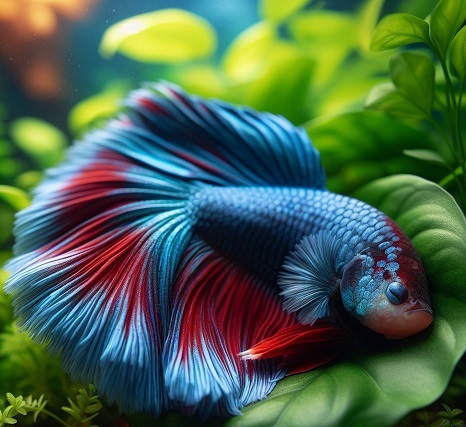The best water temperature for betta fish is between 78-82 °F (25.5-27.7 °C).
To ensure the health and well-being of these beautiful fish, it is crucial to maintain the temperature of your betta tank within this range.
Betta fish are tropical fish, native to warm waters of Southeast Asia, so they thrive in warmer temperatures. Incorrect water temperature can lead to stress, weakened immune system, and susceptibility to diseases.
Effects of Temperature on Betta Fish Health and Behavior
Temperature plays a crucial role in betta fish health and behavior. Inadequate temperature can lead to lethargy, loss of appetite, and even death. On the other hand, maintaining the right temperature can promote active behavior, vibrant colors, and overall well-being in betta fish.
Factors that Affect Temperature of Betta Fish Tank
Several factors can make a betta fish tank hotter or colder than normal. They include:
-
External factors
External factors like heat and cold weathers can directly impact the temperature of the betta fish tank. During colder seasons, the room temperature may drop, impacting the tank. It is essential to monitor and adjust the tank temperature accordingly to ensure it stays within the optimal range.
-
Tank location and insulation
The location of the tank within the room can also impact its hotness or coldness. Tanks placed near windows or doors exposed to direct sunlight or drafts may experience temperature fluctuations. Proper insulation can help maintain a stable temperature in the tank.
How to Monitor Water Temperature of Betta Fish Tank
Using heating equipment such as aquarium heaters can help maintain the warmness of a betta fish tank, especially during colder months. On the other hand, cooling equipment such as fans or chillers can be used to make it cooler and reduce overheating.
Monitoring these parameters is essential to ensure that it remains within the optimal range for your fish’s health and well-being. You can monitor this effectively with a thermometer.
Using a thermometer designed for aquarium use is the most reliable way to monitor how warm or cold your betta fish tank is. There are various types of aquarium thermometers available, including digital and analog options.
Digital vs. Analog Thermometers
Digital thermometers are often more accurate and easier to read than analog thermometers. They typically provide a digital display of the temperature, making it easy to check at a glance. Analog thermometers, on the other hand, use a traditional dial or gauge to display the temperature and may be less accurate.
How to Place Thermometers in a Betta Fish Tank
To get an accurate reading, you need to place your thermometer in the right location within the tank. Ideally, the thermometer should be placed away from any direct heat source, such as heaters or lights, as this can cause inaccurate readings. Placing the thermometer in a central location within the tank, away from any obstructions, will help ensure that it gets the right recording.
Causes and Effects of Temperature Fluctuations in Betta Fish Tanks
Temperature fluctuations in betta fish tanks can have significant effects on the health and well-being of your fish. Understanding the causes of these fluctuations and their impact is essential for maintaining a stable and healthy environment for your bettas.
Several factors can cause these fluctuations in betta fish tanks. They include:
- External temperature changes: Changes in room temperature due to weather conditions or seasonal changes can lead to fluctuations in the tank.
- Heater malfunctions: Malfunctioning or improperly set aquarium heaters can cause the water temperature to fluctuate.
- Lighting: Intense lighting, especially if the tank is exposed to direct sunlight, can increase the water temperature and cause fluctuations.
- Overcrowding: An overcrowded tank can lead to increased biological activity, which can affect water temperature.
Impact of Temperature Fluctuations on Betta Fish Health
Temperature fluctuations can have several negative effects on betta fish:
- Stress: Sudden changes in warmness of the tank can cause stress in betta fish, leading to health issues and a weakened immune system.
- Disease susceptibility: Stressed fish are more susceptible to diseases, such as fin rot and itch.
- Behavioral changes: Fluctuations in temperature can cause reduced activity. You’ll notice that your betta fish sleeps more than necessary.
How to Maintain a Stable Temperature for Betta Fish Tank
To prevent temperature fluctuations, you have to ensure that your fish live in a stable environment. Here are some things you can do to maintain a stable temperature for your betta fish:
- Use a reliable heater: Invest in a high-quality aquarium heater and regularly check and calibrate it to maintain a stable temperature.
- Monitor room temperature: Keep an eye on how cold or hot the room is, to know when to use your cooler or heater.
- Avoid direct sunlight: Place your tank away from direct sunlight and use aquarium lights with a timer to regulate lighting.
- Avoid overcrowding: Maintain an appropriate number of fish in your tank to prevent excessive biological activity, which could increase the hotness of the tank. Using a betta fish tank filter also helps to ensure that impurities don’t clog up the tank.



